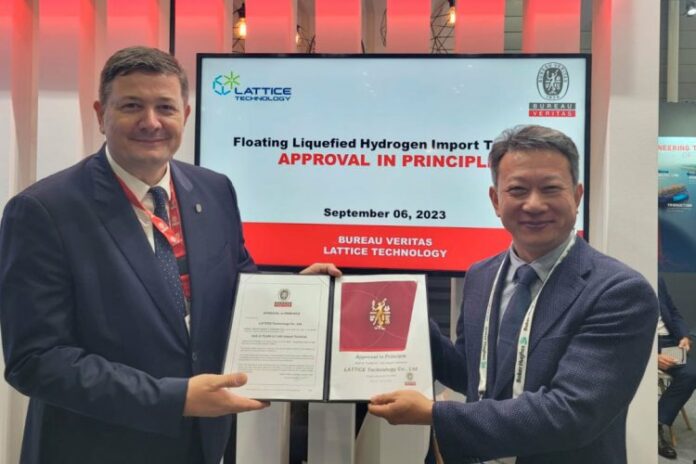Bureau Veritas (BV), a world leader in testing, inspection, and certification, has delivered an Approval in Principle (AiP) to LATTICE Technology Co., Ltd. (LATTICE) for its innovative design and development of a 75,000 CbM floating liquified hydrogen (LH2) import terminal.
The import terminal will receive the liquefied hydrogen from an LH2 carrier and store it, allowing for gas and liquid hydrogen to be supplied on demand. All the terminal functions are contained on a barge – a non-propelled floating unit, that can be fabricated and tested in a shipyard before delivery. The LH2 containment system, the V-CCS (Vacuum Cargo Containment System) consists of a Lattice Pressure Vessel (LPV) with vacuum polyurethane insulation and a flexible gas-tight membrane barrier to minimize the size of the barge hull, eliminate boil-off and substantially reduce the insulation weight.
The floating LH2 terminal project team is led by Korean and Australian companies: LATTICE Technology, KOMAC, KOGAS Tech, KAIST, Elecseed and LH2 Energy. This international collaboration project is funded by the Korea Institute of Energy Technology Evaluation and Planning (KETEP). The project will be continued with further design development and optimization of the integrated unit until the end of 2023.
Daejun Chang, Technical Supervisor of LATTICE Technology, said:
“The barge-mounted import terminal is an innovative and fast-track solution for intercontinental shipping of liquid hydrogen in that it can be fabricated and deployed in a copy-and-paste way to shorten the delivery time with cost effectiveness, fabrication quality, and operational safety secured.”
Alexander Gregg-Smith, Senior Vice President of Bureau Veritas Marine & Offshore North Asia Zone, said:
“A Bureau Veritas Approval in Principle is significant for the development of new technology – in this case floating infrastructure to support the development of a zero-carbon fuel supply chain. We are particularly pleased to have been involved in this technology project and look forward to supporting its onward development.”



